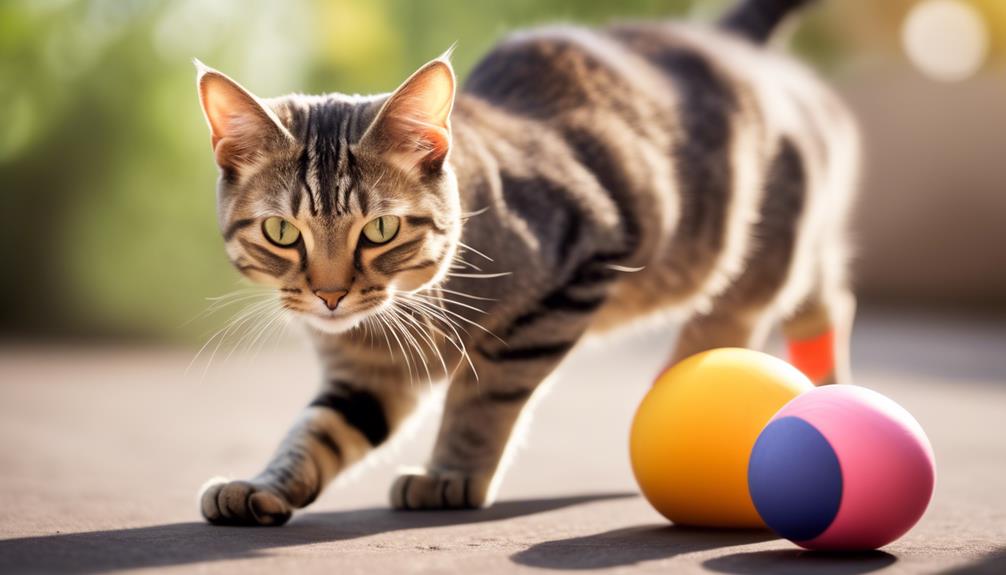Understanding and Tackling Common Feline Health Issues
Just like tending to a delicate garden, caring for your feline companion's health requires attention to detail and a proactive approach. From dental issues to behavioral concerns, the world of feline health is vast and multifaceted.
As a responsible cat owner, you want to ensure that your furry friend leads a happy and healthy life. Understanding and addressing common feline health issues is essential in achieving this goal.
So, let's explore the key areas that demand your attention and learn how to navigate the intricacies of feline health with confidence and competence.
Dental Health: Common Issues and Care
Maintain your cat's dental health by regularly brushing their teeth and providing dental treats to prevent common issues like tartar buildup and gingivitis. Preventive care is essential in avoiding dental problems in your feline friend.
Bad breath in cats can often indicate dental issues such as tartar buildup or gingivitis. By implementing a routine of brushing your cat's teeth, you can significantly reduce the chances of bad breath and other dental problems. Additionally, dental treats designed to promote oral health can aid in preventing these issues.
Despite your best efforts, professional cleanings may still be necessary to ensure your cat's dental health. Even with regular brushing and dental treats, tartar buildup can occur, leading to potential tooth decay and gingivitis. Professional cleanings by a veterinarian are crucial in addressing these issues. They can remove stubborn tartar and plaque that regular brushing may not eliminate, thus preventing further dental problems.
Nutrition: Balancing Your Cat's Diet
To ensure optimal health for your cat, it's important to carefully balance their diet with a mix of high-quality protein, essential fatty acids, and vitamins and minerals. Meeting your cat's dietary requirements is crucial for their overall well-being.
High-quality protein sources such as meat, fish, and poultry are essential for maintaining your cat's lean muscle mass and supporting their immune system. Essential fatty acids, found in oils and some fish, are important for your cat's skin and coat health. Additionally, vitamins and minerals from sources like fruits, vegetables, and supplements are necessary for various bodily functions.
Portion control and feeding schedules play a significant role in maintaining your cat's ideal weight and preventing health issues. It's essential to measure your cat's food portions to avoid overfeeding, which can lead to obesity and related health problems. Feeding schedules should be consistent, providing your cat with regular meals to establish a routine and prevent overeating.
When considering nutrient sources, it's crucial to consult with your veterinarian to determine the best diet for your cat's individual needs. Factors such as age, activity level, and any existing health conditions should be taken into account when planning your cat's nutrition.
Parasites: Prevention and Treatment
After carefully balancing your cat's diet to ensure optimal health, it's important to address the prevention and treatment of parasites. Parasites can pose a significant threat to your cat's well-being, but there are effective measures you can take to protect them.
- Regular Veterinary Check-ups: Scheduling routine visits to the veterinarian enables early detection of any potential parasite-related issues and allows for prompt intervention.
- Environmental Management: Keeping your cat's living environment clean and free from potential sources of parasites, such as fleas and ticks, is crucial in preventing infestations.
- Use of Preventive Medications: Administering preventive medications as recommended by your veterinarian can significantly reduce the risk of your cat developing parasitic infections.
When it comes to treatment, there are various effective medications available to address parasitic infestations in cats. Your veterinarian can prescribe the most suitable medication based on the specific type of parasite affecting your cat. It's essential to follow the prescribed treatment regimen diligently to ensure the complete eradication of the parasites.
Respiratory Problems: Recognizing Signs
Recognize the signs of respiratory problems in your cat to ensure prompt attention and care for their health. Cats can suffer from various respiratory issues, and being able to recognize symptoms early can make a significant difference in their treatment and recovery.
Common signs of respiratory problems in cats include sneezing, coughing, wheezing, labored breathing, nasal discharge, and open-mouth breathing. If you notice any of these symptoms in your cat, it's crucial to seek veterinary care promptly.
Understanding the causes of respiratory problems in cats is essential for proper treatment. Respiratory issues can be caused by infections, allergies, asthma, foreign objects stuck in the airways, or more serious conditions such as pneumonia or lung cancer. A thorough examination by a veterinarian can help determine the underlying cause and the most effective treatment plan for your cat.
Proper treatment for respiratory problems in cats may include medication, such as antibiotics for infections, corticosteroids for inflammation, or bronchodilators for asthma. In severe cases, hospitalization and supportive care may be necessary.
Preventative measures, such as keeping your cat's environment clean, minimizing exposure to smoke and other respiratory irritants, and staying up to date on vaccinations, can also help reduce the risk of respiratory issues. Regular veterinary check-ups can aid in early detection and intervention, contributing to your cat's overall respiratory health.
Urinary Tract Health: Causes and Remedies
What are the common causes of urinary tract issues in cats, and how can you help prevent and treat them?
Feline urinary tract problems can be caused by a variety of factors including diet, dehydration, and stress.
To prevent and treat these issues, you can take the following steps:
- Hydration: Make sure your cat has access to fresh water at all times. Consider adding wet food to their diet to increase their water intake.
- Preventing Crystals: Feed your cat a high-quality, balanced diet to prevent the formation of urinary crystals. Look for cat food that's specifically formulated to support urinary tract health.
- Natural Remedies: Consider incorporating natural remedies such as cranberry supplements or herbal supplements into your cat's diet to support urinary tract health.
In addition to these steps, it's important to monitor your cat's behavior and litter box habits for any signs of urinary issues. If you notice any changes in frequency of urination, straining to urinate, or blood in the urine, it's crucial to seek veterinary care promptly.
Skin and Coat: Allergies and Maintenance
To continue maintaining your cat's overall health, it's important to be aware of potential skin and coat issues, such as allergies and maintenance.
Skin allergies can be a common problem for cats, leading to itchiness, redness, and even hair loss. If you notice your cat excessively grooming, scratching, or showing signs of discomfort, it's crucial to consult with a veterinarian to determine if allergies are the cause.
Additionally, coat shedding is a natural process for cats, but excessive shedding may indicate an underlying issue. Regular grooming can help manage shedding, as well as prevent matting and tangles.
Moisturizing your cat's skin is also an essential part of maintaining their coat health. Just like humans, cats can suffer from dry, flaky skin, especially during the winter months. Using a veterinarian-recommended moisturizing shampoo and conditioner can help keep your cat's skin hydrated and healthy.
Furthermore, grooming techniques, such as regular brushing, not only help with shedding but also promote circulation and distribute natural oils throughout the coat, resulting in a healthier and shinier appearance.
Weight Management: Keeping Your Cat Fit

Ensuring your cat maintains a healthy weight is essential for their overall well-being and longevity. Just like humans, cats can face health issues from being overweight, so it's crucial to keep them fit. Here are some tips to help you manage your cat's weight effectively:
- Exercise Routines: Engage your cat in regular playtime activities to keep them active and help them burn off excess calories. Interactive toys, laser pointers, and climbing structures can encourage physical activity and mental stimulation.
- Portion Control: Pay attention to the amount of food you're feeding your cat. Be mindful of portion sizes and the number of treats given throughout the day. Consult with your veterinarian to determine the appropriate portion sizes based on your cat's age, weight, and activity level.
- Treat Alternatives: Instead of high-calorie treats, consider offering healthier alternatives such as small pieces of cooked chicken or freeze-dried meat. These options can still be rewarding for your cat without adding unnecessary calories to their diet.
Behavioral Health: Addressing Anxiety and Stress
Managing your cat's weight is crucial for their overall well-being. It's also important to address any anxiety and stress they may be experiencing. Cats, like humans, can suffer from anxiety and stress. This can lead to various behavioral issues and affect their overall health.
Environmental enrichment plays a significant role in reducing stress and anxiety in cats. Providing them with a stimulating environment, including interactive toys, scratching posts, and access to safe outdoor spaces, can help alleviate their stress.
In addition to environmental enrichment, calming techniques such as gentle petting, soothing music, and creating a quiet space for your cat can also contribute to reducing their anxiety. Behavioral modification techniques, like positive reinforcement training, can help modify anxious behaviors. By rewarding calm and confident behaviors, you can help your cat feel more secure and less stressed in various situations.
Furthermore, pheromone therapy can be beneficial in managing your cat's anxiety and stress. Synthetic pheromones, available in diffusers, sprays, and collars, can create a sense of security and reassurance for your cat, helping to reduce their anxiety levels.
It's important to note that if your cat's anxiety and stress are severe or persistent, consulting a veterinarian or animal behaviorist is advisable. They can provide professional guidance and develop a tailored plan to address your cat's specific needs, ensuring their overall well-being and happiness.
Frequently Asked Questions
How Can I Keep My Cat Entertained and Mentally Stimulated to Prevent Behavioral Issues?
To keep your cat entertained and mentally stimulated, try incorporating interactive toys and enrichment activities. Environmental enrichment and puzzle feeders can also help prevent behavioral issues by providing mental stimulation and physical activity for your feline friend.
What Are Some Lesser-Known Signs of Respiratory Problems in Cats That I Should Watch Out For?
You should pay attention to subtle signs like rapid breathing, coughing, or sneezing when recognizing symptoms of feline respiratory issues. Consider alternative, natural treatments to support urinary health, as they can sometimes be related.
Are There Any Alternative Treatments for Urinary Tract Health Issues Besides Medications?
If your cat is dealing with urinary tract health issues, you can consider natural remedies and herbal supplements as alternative treatments. These options may offer relief and support your cat's urinary tract health in a more holistic way.
How Can I Help My Cat Maintain a Healthy Weight Without Strict Dieting?
To help your cat maintain a healthy weight without strict dieting, incorporate interactive toys and exercise routines into their daily routine. Use healthy treats in moderation and practice portion control. This approach promotes an active lifestyle and balanced nutrition.
What Are Some Common Dental Health Issues in Cats That Are Often Overlooked?
To prevent tartar buildup in your cat's mouth, it's essential to prioritize dental care at home. Regular brushing and providing dental treats or toys can help maintain your cat's oral health and prevent common dental health issues.
Conclusion
Now that you have a better understanding of common feline health issues, you can take proactive steps to keep your cat happy and healthy.
By providing proper dental care, balanced nutrition, parasite prevention, and addressing respiratory, urinary, skin, and weight management issues, you can ensure your cat's overall well-being.
Don't forget to also address any behavioral health concerns to create a comfortable and stress-free environment for your beloved feline friend.
